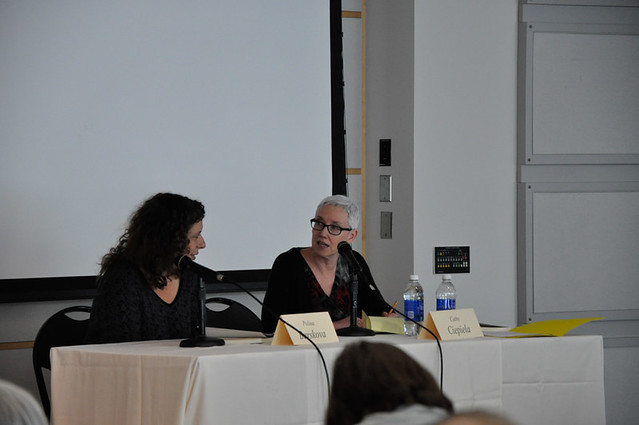Event Highlights: Russian Voices – A Poetry Symposium and Philosophical Cabaret Event
On Wednesday, November 20, with thanks to the Center for the Humanities, the Jewish Cultural Endowment, the Department of Modern Language and Comparative Literature, and Zephyr Press for their generous support, the Center for the Study of Europe hosted Russian Voices, a day-long celebration of Russian poetry, music, and culture. The event coincided with the launch, by Zephyr Press, of Relocations, an anthology of contemporary Russian poetry by Polina Barskova, Anna Glazova, and Maria Stepanova, edited by Catherine Ciepiela, and translated from the Russian by Catherine Ciepiela, Anna Khasin and Sibelan Forrester. We were delighted to bring the three poets together for the celebration, which featured panel discussions with the poets and their translators, a roundtable discussion moderated by local Russian poet Katia Kapovich, and rollicking “philosophical cabaret” performance by Psoy Korolenko and collaborator Alyona Arenkova. Also participating were BU faculty members Olga Livshin, Yuri Corrigan, and Katherine O’Connor; and Jim Kates from Zephyr Press. For the schedule of events, including bios of the participants, please see our earlier event announcement.
If you were not able to attend the symposium, you can listen recordings of the conversation below. And please support our friends at Zephyr Press by purchasing a copy of Relocations.
About the book:
The fall of the Soviet Union released creative energies that have shaped a new Russian poetry. Polina Barskova, Anna Glazova and Maria Stepanova belong to the generation that has led this epochal transformation. Born in the 1970s, they are old enough to have visceral memories of Soviet life but young enough to move adeptly with the new influences, new media and new choices introduced in the post-Soviet era. Together they represent a contemporary Russian culture that reaches beyond national borders: Barskova has emigrated to the US, Glazova is based in Germany and Stepanova is a lifelong Muscovite.
Their generation is also the last one raised on Russian modernism, which these poets are renovating from within. While they possess the modernists’ erudition, they decline to worship high culture. They have no patience for modernist mythologies of the poet. They have moved beyond the modernists’ death-match with totalitarianism to think critically about politics and culture–Barskova as an historian of Petersburg, Glazova as a theorist and translator of Central European writing, and Stepanova as the editor of an independent online journal. They mistrust lyric emotion, confidently leaving behind Marina Tsvetaeva and Anna Akhmatova as poets of female desire while remaining conscious of themselves as writing women. As this gathering of these poets’ work signals, women are more influential in Russian poetry than ever before.
The poems in the book are presented in Russian and English.

